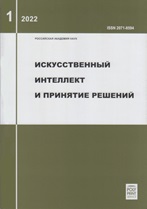|
Knowledge representation
Notional model of knowledge
V. S. Vykhovanets
Bauman Moscow State Technical University, Moscow, Russia
Abstract:
The article discusses the well-known methods of knowledge representation and processing. A new model, called notional, is proposed, characterized in that the relations (links) between notions are considered as ordinary notions. The notion is considered as a form of thought expressed by a named set of entities. A concrete notion identifies one entity. An abstract notion is formed from other notions by generalization (union) and association (Cartesian product) them. Declarative knowledge is given by enumerable sets of entities, and procedural knowledge is given by solvable ones, where resolving procedures are expressed by formulas of the pure monadic predicate calculus. The description of the applied language of knowledge representation and processing is given. It is proved that queries to the notional model are executed in polynomial time from the logarithm of the average number of entities in notions. The possibility of unsupervised learning notional models is substantiated. It is shown that the notional model makes it possible to visually represent and effectively process both declarative and procedural knowledge.
Keywords:
knowledge representation, knowledge processing, knowledge models, notional model, declarative knowledge, procedural knowledge, unsupervised learning, intelligent information system.
Citation:
V. S. Vykhovanets, “Notional model of knowledge”, Artificial Intelligence and Decision Making, 2024, no. 3, 18–31
Linking options:
https://www.mathnet.ru/eng/iipr595 https://www.mathnet.ru/eng/iipr/y2024/i3/p18
|

| Statistics & downloads: |
| Abstract page: | 45 | | First page: | 11 |
|




 Contact us:
Contact us: Terms of Use
Terms of Use
 Registration to the website
Registration to the website Logotypes
Logotypes









 Citation in format
Citation in format 